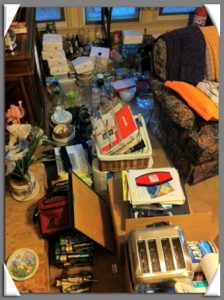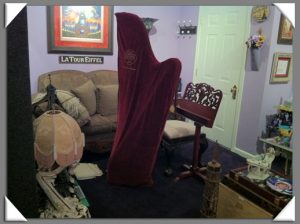Do you ever watch the TV show Hoarders? It’s about people who have let their houses become completely overrun with STUFF. The hoarding is usually caused by some sort of traumatic loss, like a death of a loved one, a painful divorce, or children leaving the nest.
For 6 weeks during August and September, Drew and I sort of learned how hoarders live while our old kitchen died and a new one was brought to life. I also learned a few things about clutter from the show and from our experience that I want to share with you before clutter kills your voiceover career.
Before our contractors could gut the kitchen (you didn’t really think we were doing it ourselves, did you?), we had to empty the kitchen cabinets. All of that stuff had to be stored somewhere, and most of it landed on the floor in the living room. Some of it went in the hall bathroom, like drinking straws, dog food, and our printer and network components.


everywhere in Atlanta voice talent Karen Commins’ living room.
Our house was designed with a dining room next to the kitchen, with a shared doorway between the 2 rooms. Since we use the dining room for the music room, we decided we wanted to enclose that shared doorway to give us more counter space in the kitchen.
Of course, this decision meant that the music room would also need to have new sheetrock and paint. We evacuated my harp and some other fragile things from the music room and stored much of them in — you guessed it — my voiceover recording studio.
People on the TV show always say they feel overwhelmed by the clutter. They frequently go shopping to temporarily relieve those feelings of overwhelm and despair. Naturally, the items they buy only add to the clutter when they get home, and thus perpetuate the cycle.
The hoarders often say that they can’t do something they dream about doing because of the clutter. How can you really concentrate on furthering a dream when you have a pile of clutter in front of you, silently demanding that you do something about it before you tackle anything else? Clutter causes people to give up on their dreams before they even start.
In the past 2 months, Drew and I had to alter our routines and work harder just to do the simplest things. We constantly found ourselves looking for something we needed. Even though we had carefully placed our kitchen items neatly on the floor, we still had to look in boxes and step over things to get what we wanted.
The true hoarders always seem to have a variety of health problems. They are literally suffocating in their stuff. At a minimum, clutter can cause stress; at its worst, it can cause illness or even death.
I haven’t seen a true hoarder’s house except on TV. However, I have been in some horrendously messy, dirty offices in my professional life.
In my former job as a computer network administrator, I hated the times that I had to install something new or change out equipment due to the condition of the cubicles and offices. I didn’t want to touch anything! People often piled papers and empty coffee cups in their cubicles and offices. Every surface was snowed under in a messy blizzard of paper, and old, stinky shoes and newspapers often lined the floor. I wondered if they lived that way at home. I also wondered how they ever got any work done.


the music room found a temporary home in the recording studio.
I still can’t answer the first question, but I have a better guess about the second one. Clutter zaps your mental energy and steals your creativity. It’s really hard to get anything done at all, much less done well, with clutter blocking your path.
While the stuff from the music room was sitting in the studio, I was very disinclined to go in there for anything but necessary voiceover work. Working on my laptop in the living room wasn’t any better because of the mound of stuff there. Blog posts, recordings for LibriVox service projects, a podcast series I’m developing, some follow-up marketing, a video I’d like to produce, even many auditions — all these projects subconsciously went on hold until the kitchen renovation was done.
My extreme clutter was temporary, and thankfully, order, beauty, and calmness have been restored to my house. However, the fight against clutter is an on-going one, so here are 5 tips and tactics I use to combat it:
1) Determine your vision for your life and figure out how each space supports that vision.
I learned this powerful tip from professional organizer, TV star, and best-selling author Peter Walsh. He says that each room should have its own function and limits. Until you know these attributes, you can’t really define what clutter is to you.
For instance, my studio serves a single function. If I’m in there, I’m doing something creative related to my voiceover career. I’m not paying bills, chit-chatting with friends on the phone, surfing Facebook, or designing scrapbook pages. My harp and the other stuff from my music room, while certainly beautiful and functional, did not further my vision for my studio. These pieces are treasures in my music room, but they felt like clutter when they were in my studio.
2) Adopt the motto A place for everything, and everything in its place.
This point is never more important than when you are faced with a life event such as job change, marriage, new child, divorce, or death. In those instances, you can expect LOTS of things to come into your house in a very short period of time. Since the life event brings stress with it, you have to be vigilant that clutter does not take root. If it does, it becomes a constant reminder of the stress from the event.
The key is to make immediate decisions about where each item will be stored, and then PUT IT THERE!
3) Ask yourself the hard questions, both for things you have and things you want to buy.
- What is your attachment to this thing? I’ve seen Peter Walsh work wonders with people over this question as it’s important to understand emotions that cause us to have clutter. It’s okay to have things because they remind you of a loved one or some special time. You have to realize, though, that the thing and the memory are entirely separate. Sometimes you can part with the thing, but you will always have the memory.
- When is the last time you used it? If you haven’t used it in more than a year, you might think about getting rid of it.
- What is your plan for it? Saying “I might need it someday” is not a good answer and is a sure sign that you should consider letting it go.
- If you actually use it and have a plan for it, is this the best place for it to live, or should it be somewhere else? We found stuff in the kitchen that needed to be (and now is) stored in the garage or in the office files. In truth, we also found stuff that needed to be (and now is) in the trash, like addresses for our wedding invitations
4) Don’t accept stuff from other people just because they want to get it out of their house.
My in-laws are notorious in giving us things every time we go over there. Drew’s mother usually wants to load us up with magazines that she wants returned, and his dad frequently gave Drew tools that Drew didn’t need. None of this stuff needs to be in our house! Even in seemingly harmless instances like these, we have to make conscious decisions every day about everything that comes in our door.
5) Give yourself permission to sell, donate, or throw away anything that doesn’t fit your vision for your space.
We frequently donate items to charities. We also post ads on Craigslist to give things away. For instance, you may not believe this, but I gave away the Auralex pyramid studio foam I used when I recorded in my walk-in closet.
When we’ve posted ads for free things on Craigslist, people respond immediately — like within 10 minutes! People who are picking up a freebie are usually eager to come and get it, so Craigslist ads are a fast, easy way to declutter.
Your outer environment is a reflection of your inner thoughts. Is your environment orderly and serene, or chaotic and confused? Since your action follows your thoughts, a cluttered space can kill your voiceover career, while a clear space causes you to reach new heights!
Do you see any connection between clutter and voiceover success? I’d love to get your comments on the blog!